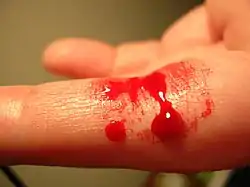bleed
English

A bleeding wound on a finger.
Etymology
From Middle English bleden, from Old English blēdan (“to bleed”), from Proto-Germanic *blōþijaną (“to bleed”), from *blōþą (“blood”). Cognate with Scots blede, bleid (“to bleed”), West Frisian bliede (“to bleed”), Saterland Frisian bläide (“to bleed”), Dutch bloeden (“to bleed”), Low German blöden (“to bleed”), German bluten (“to bleed”), Danish bløde (“to bleed”), Swedish blöda (“to bleed”).
Pronunciation
- IPA(key): /ˈbliːd/
Audio (file) - Rhymes: -iːd
Verb
bleed (third-person singular simple present bleeds, present participle bleeding, simple past and past participle bled)
- (intransitive, of a person or animal) To lose blood through an injured blood vessel.
- If her nose bleeds, try to use ice.
- (transitive) To let or draw blood from.
- 1979, Octavia Butler, Kindred:
- "What did they die of?" I asked.
"Fevers. The doctor came and bled them and purged them, but they still died."
"He bled and purged babies?"
"They were two and three. He said it would break the fever. And it did. But they ... they died anyway."
- "What did they die of?" I asked.
- 1979, Octavia Butler, Kindred:
- (transitive) To take large amounts of money from.
- (transitive) To steadily lose (something vital).
- The company was bleeding talent.
- (intransitive, of an ink or dye) To spread from the intended location and stain the surrounding cloth or paper.
- (transitive) To remove air bubbles from a pipe containing fluids.
- (obsolete, transitive) To bleed on; to make bloody.
- 1485 July 31, Thomas Malory, “(please specify the chapter)”, in [Le Morte Darthur], book VIII, [London]: […] [by William Caxton], OCLC 71490786; republished as H[einrich] Oskar Sommer, editor, Le Morte Darthur […], London: Published by David Nutt, […], 1889, OCLC 890162034::
- And so Sir Trystrames bledde bothe the over-shete and the neyther-shete, and the pylowes and the hede-shete
-
- (intransitive, copulative) To show one's group loyalty by showing (its associated color) in one's blood.
- He was a devoted Vikings fan: he bled purple.
- To lose sap, gum, or juice.
- A tree or a vine bleeds when tapped or wounded.
- To issue forth, or drop, like blood from an incision.
- Alexander Pope
- For me the balm shall bleed.
- Alexander Pope
- (phonology, transitive, of a phonological rule) To destroy the environment where another phonological rule would have applied.
- Labialization bleeds palatalization.
Derived terms
Derived terms
Translations
lose blood
|
|
draw blood
Noun
bleed (plural bleeds)
- An incident of bleeding, as in haemophilia.
- (printing) A narrow edge around a page layout, to be printed but cut off afterwards (added to allow for slight misalignment, especially with pictures that should run to the edge of the finished sheet).
- (sound recording) The situation where sound is picked up by a microphone from a source other than that which is intended.
Translations
incident of bleeding
References
- bleed in The Century Dictionary, New York, N.Y.: The Century Co., 1911.
- bleed in Webster’s Revised Unabridged Dictionary, G. & C. Merriam, 1913.
Plautdietsch
Derived terms
- Bleedheit
This article is issued from Wiktionary. The text is licensed under Creative Commons - Attribution - Sharealike. Additional terms may apply for the media files.